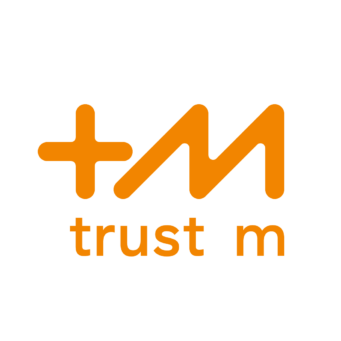By Rūta Šerpytytė – Design Researcher at Trust-M
A social psychologist, a designer, a computer scientist and a public servant walk into a bar…
The Trust-M team consists of nearly 30 people with various backgrounds, including sociology, social psychology, anthropology, participatory design, migration studies, human-computer interaction, natural language processing, speech processing, and more! Not only are we scattered between three universities (Tampere, Helsinki, Aalto) based in three cities, we also work closely with people from the City of Espoo who bring understanding of public sector systems and practical challenges there. With such a mix, it is easy to lose things in translation, especially when talking about complex concepts like trust or migrant integration. So, what are we doing about it?
Getting On the Same Page (GOSP)
Soon after our official project kick-off in February 2023, we realized that we needed to sit down and have a talk. Acknowledging that certain amount of ambiguity in the beginning of a new project in a new team is unavoidable, we still wanted to arrive at some shared understanding of what Trust-M is about. Designers, practicing what they preach, suggested having a collaborative workshop as opposed to another team meeting, to make things more engaging and hands-on. On March 31st, 2023 we held our very first Getting on the Same Page (GOSP) workshop. After the success of the first gathering, we decided to make this a tradition and have these every semester. That’s how we established an internal practice for co-sensemaking and aligning our thoughts as a team.
Organizational practicalities
The organizing team of these workshops usually consists of 2 designers, the interaction coordinator and the project manager from the City of Espoo. After deciding the date (which is a journey on its own), we set up a simple form to gather everyone’s thoughts on the workshop content, current worries, or urgent themes. Some suggestions come from the steering group (e.g. need to decide on our research vision for the next 3 years), some from the junior researchers (e.g. I need clarity about my role in the project). During weekly meetings with the organizing team, we finalize the themes and decide on the methods and activities best suited to tackle them. Keeping in mind that these gatherings also serve the team building purposes, we try to include some fun energizers, and mix the groups a bit so people from different institutions can talk to each other. To have more fruitful discussions, participants are asked to complete a pre-task, mainly consisting of reflection questions.
GOSP#1
The first workshop was divided into four parts, tackling the four most important questions at that time.
1. What is Trust in Trust-M?
Trust is an overarching theme of the Trust-M project, but it is not the easiest concept to grasp. We decided to first approach this through a personal lens – who/what do you trust? Then, we discussed the concept of trust in small groups with people from the same field. Finally, we opened up the question for the room discussion, hoping to make some connections. Some nice insights emerged, for example, how should we look at trust as a dynamic process and as an experience, take into account the vulnerability that is a prerequisite of trust, or different levels of trust, such as undertrust (trusting less that one should) or overtrust (trusting too much). After carefully documenting the discussion, the main points were summarized in a visual map. This activity informed the way we talk about trust as well as some theoretical trust frameworks.
2. How do our research goals and aspirations align?
Research work can become a lonely process and it’s important to start connecting the dots from the very beginning, to avoid doing the same job twice and see which collaborations could end up in something beautifully unexpected! To look into this topic, we put up four big paper sheets on the wall, letting people walk around and leave post-its on (1) their research goals and unique angles, (2) groups of participants they want to involve, (3) their planned methods and (4) shared timeline. This exercise was not only helpful to find the right teammates to talk to, but also informed our research ethics application and a project plan presentation for our stakeholders.
3. What are our project values?
Working in a relatively small, very diverse and mainly self-organized team such as Trust-M requires having some shared values. This can really help when making decisions, defining our success and seeing the meaning of our work. To start discussing values, again, we started from our personal ones. Then, in pairs, we made posters that represent values we should take into account when working in Trust-M. Each pair had a mini presentation and there was time to walk around this poster gallery and leave some feedback (hearts, +1s, connecting arrows, exclamation points). Some time after the workshop, two designers held a mini analysis session to categorize all of these values and found four underlying ones: collaboration, autonomy, care (migrant-centricity) and persistence. Further on, this was developed into our principles for research and design, where we analyze our internal practices, collaboration with external partners and participants, and research outcomes through the lenses of these 4 values.
4. How to think about generative AI beyond chatbots?
For people outside the field of technology it can be hard to imagine how machine learning or natural language processing works, and it’s easy to get lost in misconceptions about AI. Trust-M is about creating trustworthy services for migrants, and somehow there was a certain fixation on chatbots as such a service. To open up our minds to think beyond that, we had a small brainstorming session on other ways technology could become a mediator for better migrant integration. That is, in the situations where technology is needed in the first place!
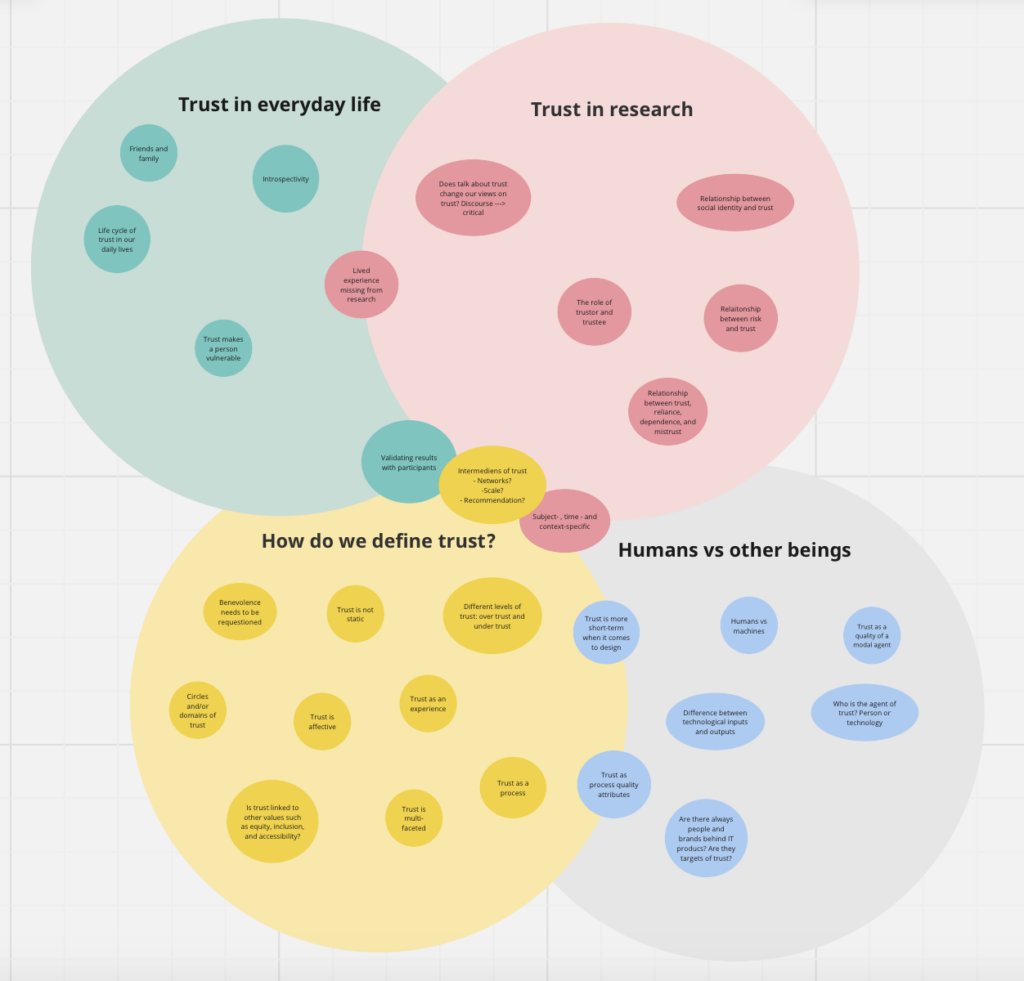
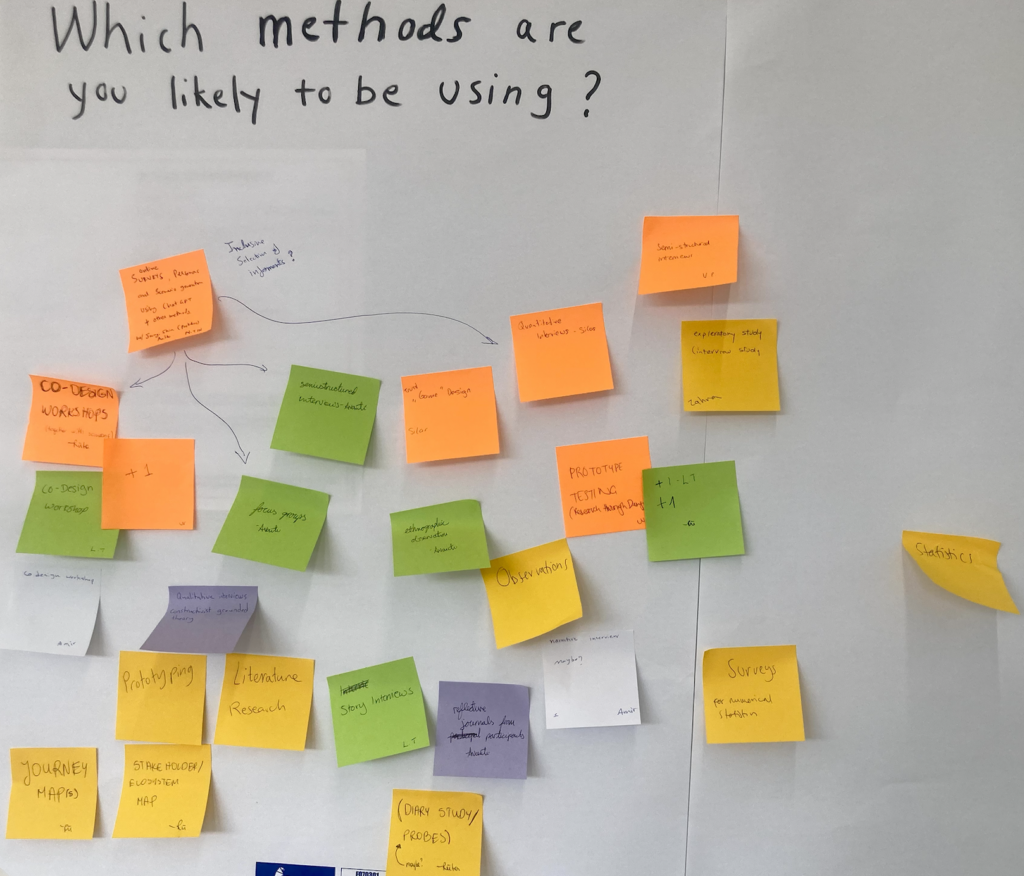

GOSP#2
At the end of September 2023, we gathered for our second workshop. We were mainly building on last one’s outcomes, with some new themes that appeared along the way.
1. Aligning our thoughts on Trust-M project
As an icebreaker, we asked team members from different disciplines to give a 2-minute presentation on Trust-M. We wanted to see what are the main parts of the project that people are highlighting, and if everyone uses a similar tone and language to describe what we do. As all 3 presenters mentioned better migrant integration, working with the public sector and aiming for tangible outcomes, we affirmed that everyone understands the primary project goals similarly. We shared our thoughts on what else should be emphasized and what should be avoided.
2. Building our research map
The main objective of this workshop was to start tying our ongoing research together so see a clearer vision for the next couple of years. We made two smaller research maps based on our project tracks (social sciences + policy, design + tech) and then combined them into one, looking for connections. For the next part of this map, we asked our steering committee (principal investigators, project manager) to take a look at this separately, and they came back with 3-4 main tracks for the project, target groups and some cross-cutting themes – success!
3. Clarifying roles and responsibilities
We realized that after all of these months working together, it can still be unclear who does what. Employing an interactive musical activity, we had short conversations with three random teammates, telling them what we think they do, and letting them clarify. After the activity, we had time to reflect on our roles and how they could evolve for the remaining time of the project.
4. From values to practices
Taking a look at our project values that emerged from the previous workshop, we sat down to think how those could be translated into practices. Some important questions emerged, for example, how do we recruit our participants, or how do we co-author papers.

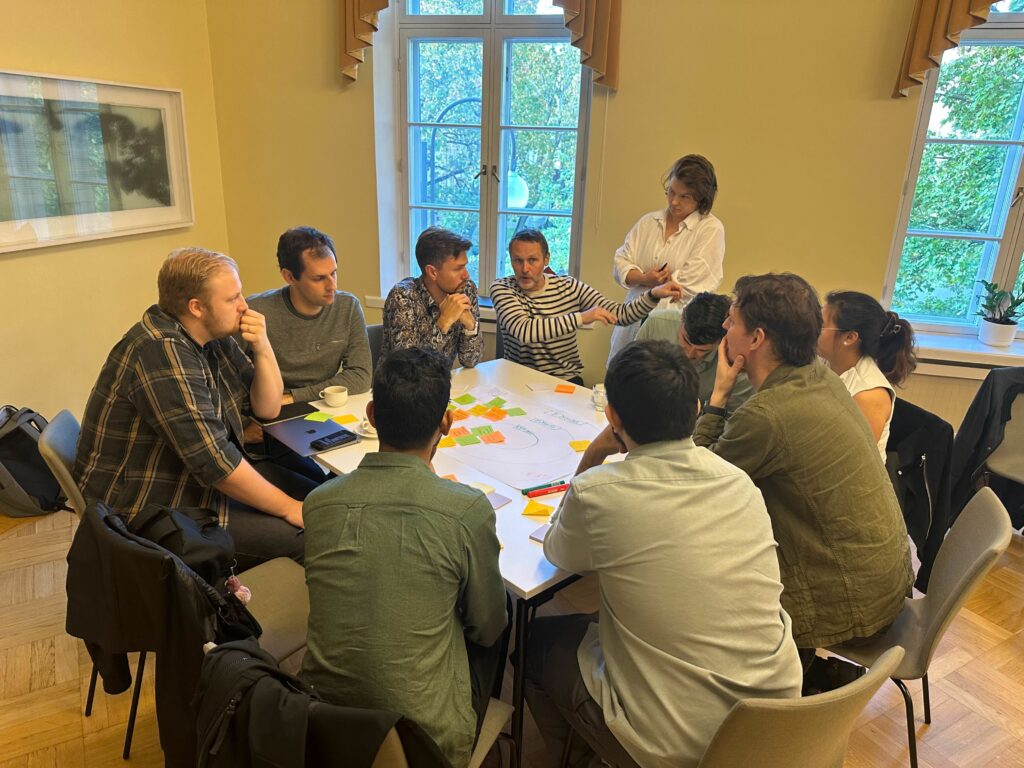
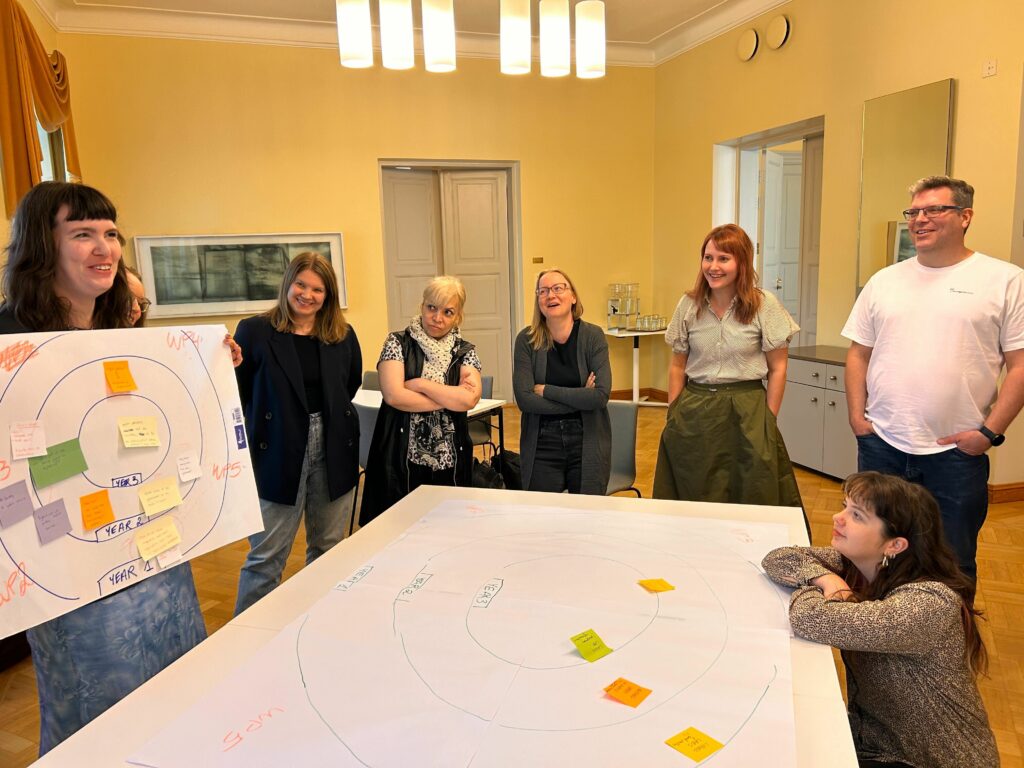
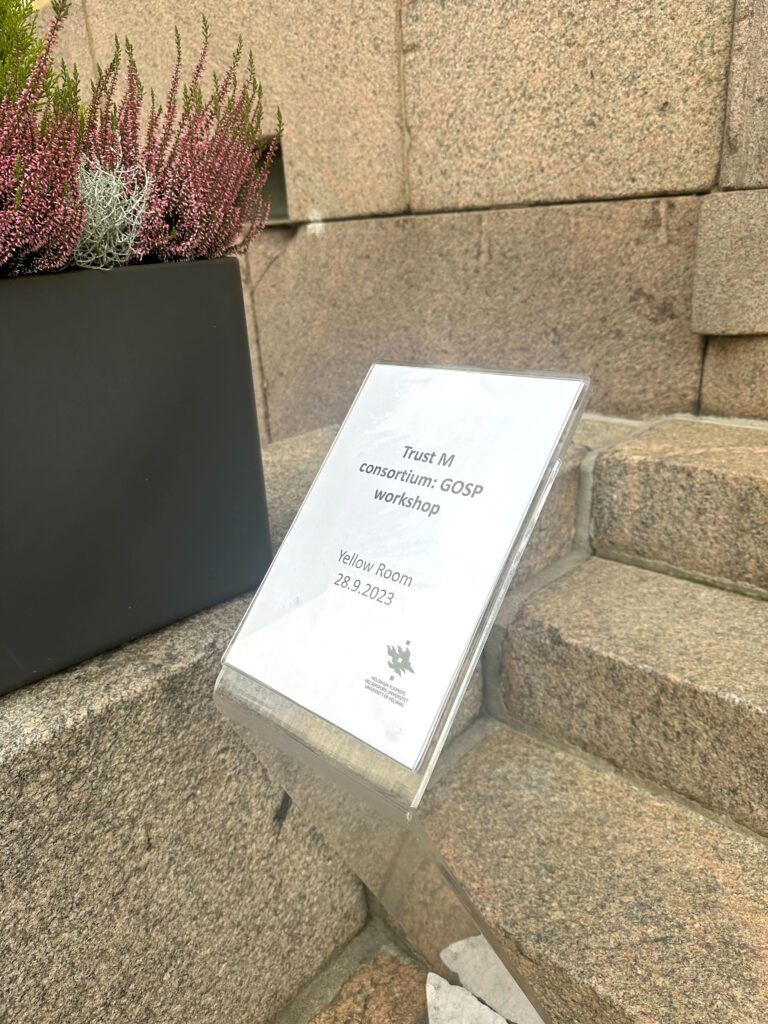
Endnotes
We realize that we will never completely agree on everything, and that’s ok! However, it’s important to keep the discussions respectful and leave the workshop with a pleasant feeling of belonging to the team. Also, the more trust we’ve built across disciplines, universities, and groups, the more efficient we’ve been and fun we’ve had – building trust is therefore at the core of everything!
These workshops were never in our project plan – they emerged as an internal initiative from a few enthusiasts with distantly related roles, after noticing the need for it. It’s really difficult to make these extra things happen, when no one has complete sense of ownership of it, However, the value is evident and we would highly recommend considering including such practices in your next big interdisciplinary project.
By sharing this blog post, we turn GOSP workshops into an ”open source” method and we’re more than happy if someone will apply our learnings to similar settings. We don’t mind people using the GOSP name and workshop activities described here, however, we would appreciate credits to Trust-M.
Team members behind GOSP initiative: Rūta Šerpytytė, Viivi Eskelinen, Irena Bakić, Amir Pakpour
